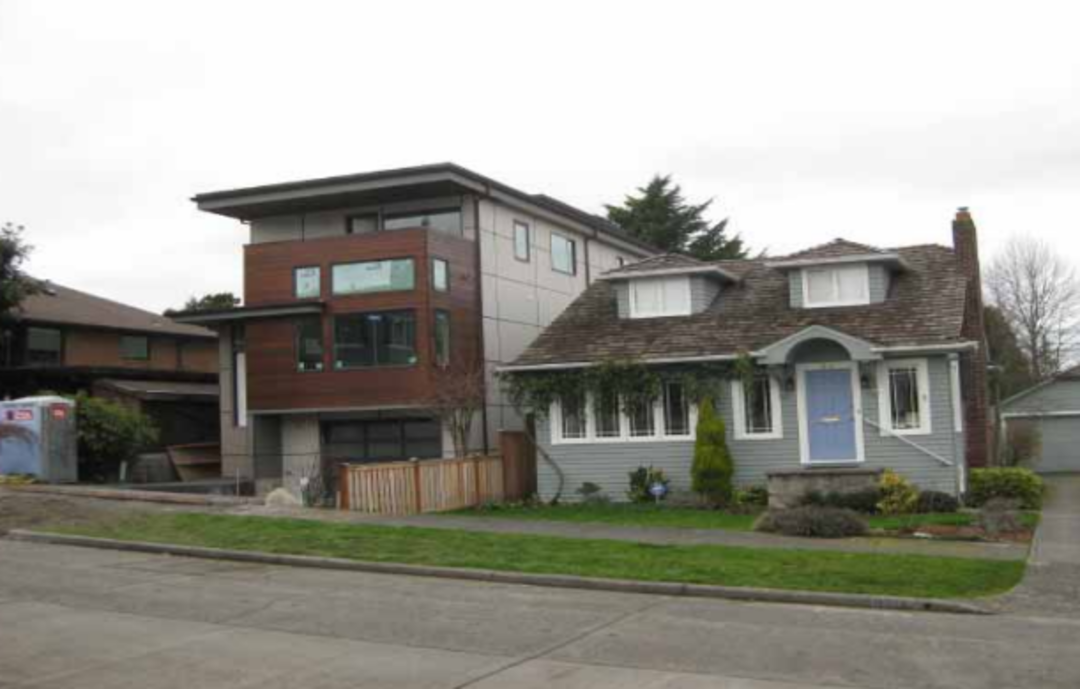On Other Blogs Today: Small Carbon Footprints, Small Lots, Smart Housing, and More

OOBT
1. Breathe easy, Seattle: Business Week reports that Seattle-based Alaska Air is the most fuel-efficient of all the major airlines, thanks largely to the fact that it flies mostly newer Boeing 737 jets and flies routes that tend to begin and end in Portland or Seattle, reducing the circuitousness of its flight paths (and thus cutting down on fuel waste).
2. In yesterday's paper, the Seattle Times continued to bang on its anti-density gong, arguing (yet again) that houses without huge yards are actually "monster houses" responsible for destroying single-family neighborhoods.
The supposed monstrosities the Times opposes are typically around 1,000 square feet (around the same size development the same paper describes as "shoeboxes" when they come in apartment form); residents oppose them for their modern design and because they are often two or three stories high. On Monday, the city council extended a moratorium preventing new single-family development on such undersized lots, which are smaller than the usual minimum lot size required for single-family houses.

3. The city's Department of Finance and Administrative Services has moved in on the former Nickelsville encampment, installing a new chain-link fence and cleaning up a giant pile of wood pallets the encampment's former occupants left behind, West Seattle Blog reports.
Despite dire predictions that Nickelsville residents would end up on the streets once the illegal encampment (which has been in place on city land for more than two years) shut down, all of its residents have been relocated, either to permanent housing or to one of three new encampments elsewhere in the city.
4. The Atlantic Cities reports on a car crash in San Francisco between a Dodge Charger and a Lincoln Town Car operated by a driver for Uber, a car service that's among several "ridesharing" services that also operate in Seattle. The controversy in this particular crash was over the Uber driver's insurance; the driver hit a car, which hit a fire hydrant, which went flying and struck a pedestrian. That pedestrian is now suing the Uber driver.
So the question now is: Who's responsible for paying for that pedestrian's medical bills—Uber? Or the driver who owns the car? Questions like that are sure to become more common as car services like Uber, Lyft and Sidecar move into more and more cities, including Seattle, where a debate is already raging about whether the companies should be regulated like taxis or treated like ridesharing services—"Your friend with a car," as Lyft's marketing materials put it.
5. Former mayoral candidate Peter Steinbrueck tells the Seattle Weekly that he probably won't endorse either of the two remaining candidates, incumbent mayor Mike McGinn nor state Sen. Ed Murray (D-43, Capitol Hill), in the mayor's race—and may even consider leaving Seattle.
"If Steinbrueck were to leave," the Weekly's Ellis Conklin writes, "we would be a Lesser Seattle."
We agree.
6. And finally, the Berkeley Blog has a smart addendum to the age-old trope that "housing policy is education policy": Transportation policy is housing policy.
"Well-funded, broad-based levels of public transportation and infrastructure through a region have the potential to connect families across that region to the entire economy and economic opportunities in the region. Conversely, poorly funded, haphazard and unreliable public transit and infrastructure can isolate families and communities from the larger economy."




